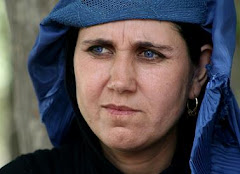 Extremist Threat to Women Increasing, Government Failing to ProtectNew York) -
Extremist Threat to Women Increasing, Government Failing to ProtectNew York) - Eight years after the fall of the Taliban, women and girls suffer high levels of violence and discrimination and have poor access to justice and education, Human Rights Watch said in a new report released today. The Afghan government has also failed to bring killers of prominent women in public life to justice, creating an environment of impunity for those who target women.
The 96-page report, "
We Have the Promises of the World: Women's Rights in Afghanistan," details emblematic cases of ongoing rights violations in five areas: attacks on women in public life; violence against women; child and forced marriage; access to justice; and girls' access to secondary education.
"The situation for Afghan women and girls is dire and could deteriorate," said Rachel Reid, Afghanistan researcher at Human Rights Watch. "While the world focuses on the Obama administration's new security strategy, it's critical to make sure that women's and girls' rights don't just get lip service while being pushed to the bottom of the list by the government and donors."
While the plight of women and girls under the Taliban was used to help justify the 2001 invasion of Afghanistan, women's rights have not been a consistent priority of the government or its international backers. With fundamentalist factions in government gathering strength, the insurgency gaining ground, and some form of reconciliation with Taliban factions firmly on the horizon, the gains made by Afghan women and girls since 2001 in areas such as education, work, and freedom of movement are under serious threat.
"Women are not a priority for our own government or the international community," Shinkai Karokhail, a member of Parliament, told Human Rights Watch. "We've been forgotten."
Women in public life are subject to routine threats and intimidation. Several high profile women have been assassinated, but their killers have not been brought to justice. When Sitara Achakzai, an outspoken and courageous human rights defender and politician, was murdered in April 2009, her death was another warning to all women who are active in public life.
High profile women interviewed for this report say that they feel they are not taken seriously when they report threats. One member of parliament who, like some others, spoke anonymously because of the danger they face, told Human Rights Watch:
"I've had so many threats. I report them sometimes, but the authorities tell me not to make enemies, to keep quiet. But how can I stop talking about women's rights and human rights?"
A woman police officer who has received death threats said:
"They told me that they will kill my daughters. Every minute I'm afraid. I can never go home - the government cannot protect me there. My old life is over."
One nationwide survey of levels of violence against Afghan women found that 52 percent of respondents experienced physical violence, and 17 percent reported sexual violence. Yet because of social and legal obstacles to accessing justice, few women and girls report violence to the authorities. These barriers are particularly formidable in rape cases. Although women activists and members of parliament pushed hard and succeeded in putting rape on the statute books this year for the first time, the government has shown little willingness to treat each case as a serious crime or to engage in a public education campaign to change attitudes.
The lack of justice compounds women's vulnerability. One woman who was gang raped by a well connected local commander found that after a long fight to bring her rapists to justice, they were freed by a presidential decree. Soon after in 2009, her husband was assassinated. The woman told Human Rights Watch that he was killed because he had battled for her rights:
"I have lost my son, my honor, and now my husband," she said. "But I am just a poor woman, so who will listen to me?"
Surveys suggest that in more than half of all marriages, the wives are under age 16, and 70 to 80 percent of marriages take place without the consent of the woman or girl. These practices underlie many of the problems faced by women and girls, as there is a strong correlation between domestic violence and early and forced marriage.
A 13-year-old girl who was forced into marriage explained to Human Rights Watch that after she dared to escape she was hunted by her husband's family: "They came and asked for me to come back. I said no; they kept coming. I always say no... I can't go back. They want to kill me." Women activists who gave the girl shelter were denounced in parliament. Years later, the young woman is still fighting for a legal separation from her illegal marriage.
This case is just one in the report that illustrates the fundamental problem faced by women and girls of lack of access to justice. Studies suggest that more than half the women and girls in detention are being held for "moral crimes," such as adultery or running away from home, despite the fact that running away from home is not a crime in Afghan law or Sharia. But whether it is a high-profile woman under threat, a young woman who wants to escape a child marriage, or a victim of rape who wants to see the perpetrator punished, the response from the police or courts is often hostile.
"Police and judges see violence against women as legitimate so they do not prosecute cases," Dr. Soraya Sobhrang of the Afghanistan Independent Human Rights Commission told Human Rights Watch.
Law reforms that protect women's rights are important, but leadership is also required to help shift attitudes and prevent abuses, Human Rights Watch said.
"The government needs to take its responsibility to protect women and girls seriously," Reid said. "President Hamid Karzai has a lot of work to do to restore his reputation as a moderate on women's rights."
After the destruction of many girls' schools by the Taliban, education for girls became the most symbolic element of the international donor effort in Afghanistan. Despite significant gains, stark gender disparities remain. The majority of girls still do not attend primary school. A dismal 11 percent of secondary-school-age girls are enrolled in grades seven through nine. Only 4 percent of girls make it to grades 10 through 12. While the number of both boys and girls attending school drops dramatically at the secondary school level, the decline is much more pronounced for girls.
The diminishing status of women's rights in Afghanistan was forced back onto the agenda in March when the discriminatory Shia Personal Status law was passed by parliament and signed by Karzai. Faced with national and international protests, Karzai allowed the law to be amended, but many egregious articles remain that impose drastic restrictions upon Shia women, including the requirement that wives seek their husbands' permission before leaving home except for unspecified "reasonable legal reasons," and granting child custody rights solely to fathers and grandfathers.
"We welcomed the international community's words on the Shia law - really - they said many beautiful things, as they did in 2001" said Wazhma Frogh, women's rights activist. "We have the promises of the world. But still we wait to see what more they will do."
Karzai should revise the law to protect women's rights fully and appoint women who have been active defenders of women's rights to positions of power, Human Rights Watch said.
"The Shia law provided a timely reminder of how vulnerable Afghan women are to political deals and broken promises," Reid said. "Karzai should begin his new presidency with a clear signal to women that his will be a government that wants to advance equality."
Key Recommendations of "We Have the Promises of the World: Women's rights in Afghanistan"- The government and donors should make the promotion and protection of women's rights a main priority of the country's reconstruction and a central pillar of their political, economic, and security strategies.
- The government, with the support of donors, should embark on a large-scale awareness campaign to ensure that rape is understood to be a crime by law enforcement agencies, judges, parliament, civil servants, and the Afghan public. The campaign should also aim to reduce the stigmatization of victims of rape.
- The government should make marriage registration more widely available and compulsory.
- The president should order the release of, and offer an apology and compensation to, all women and girls wrongfully detained on the charge of "running away from home."
- The government, with the support of donors, should increase the number and geographic coverage of girls' secondary classes by building more girls' secondary schools, and ensure the recruitment and training of female teachers is accelerated.
- The government, with the support of the UN and other donors, should prioritize security for women candidates and voters in planning for the 2010 parliamentary elections.
- International donors and the United Nations, in conjunction with the Ministry of Women's Affairs, should conduct a full gender audit of all spending in Afghanistan.
Human Rights watch





.jpg)



